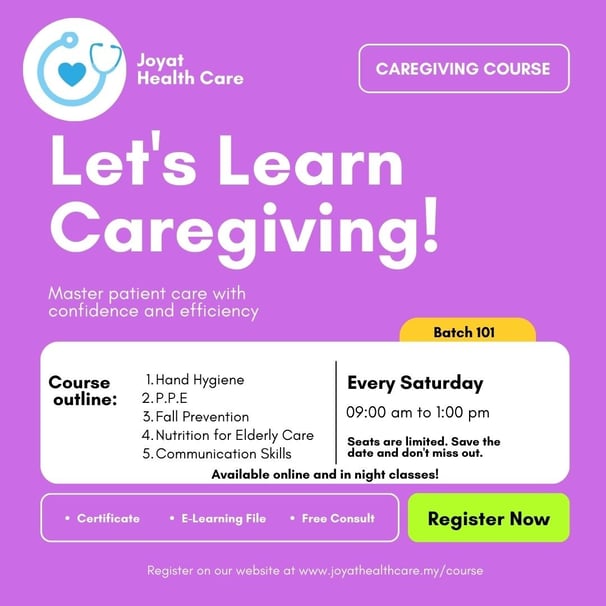JHC Basic Essential 101


Introductory Course
Purpose: To provide participants with fundamental knowledge and skills in elderly caregiving, this course aims to create a solid foundation for further learning and encourage enrollment in more advanced courses. The purpose of learning this course is to equip healthcare professionals and self home support with essential skills to deliver high-quality, safe, and effective care for elderly individuals. By completing this course, participants will be well-prepared to provide comprehensive and compassionate care, ensuring the well-being and safety of elderly individuals under their care.
Course Details
Schedule: Every Saturday of the month
Duration: 9:00 AM to 1:00 PM (4 hours including breaks)
Location: 88A, Jalan Nb2 1/4, Taman Nusa Bestari 2, 81300 Skudai, Johor
Registration Fee: RM 250 (Includes e-learning materials)
Capacity: 15 participants per session
Certification: Certificate of Achievement upon completion
Participants have the flexibility to complete the course within the month of registration, selecting the best date to suits their schedule.
Course Summary: Essential Skills for Effective Elderly Care
This course provides crucial training on fundamental aspects of elderly care, focusing on practices and skills essential for ensuring the safety, health, and well-being of elderly patients. Participants will gain knowledge and hands-on experience in key areas that impact daily care and overall quality of life for the elderly.
1. Hand Hygiene
Participants will learn the importance of proper hand hygiene in preventing infections and maintaining a safe care environment. This module covers:
Hand Washing Techniques: Effective methods for washing hands to eliminate pathogens.
Use of Hand Sanitizers: Guidelines for using alcohol-based hand sanitizers.
Infection Control: Understanding the role of hand hygiene in infection prevention.
Learning Outcome: Participants will be proficient in hand hygiene practices, reducing the risk of infections and promoting a safer care environment.
2. Personal Protective Equipment (P.P.E.)
This module focuses on the correct use of personal protective equipment to safeguard both caregivers and patients. Topics include:
Types of P.P.E.: Understanding various types of protective gear (gloves, masks, gowns, etc.).
Proper Usage: Techniques for donning, using, and removing P.P.E. correctly.
P.P.E. Management: Procedures for handling and disposing of P.P.E. safely.
Learning Outcome: Participants will be skilled in using and managing P.P.E., ensuring protection against infections and maintaining safety in the care setting.
3. Fall Prevention
Participants will learn strategies to prevent falls, a common and serious issue in elderly care. This module covers:
Risk Factors: Identifying and assessing risk factors for falls.
Preventive Measures: Implementing strategies to reduce fall risks, such as environmental modifications and patient education.
Emergency Response: Procedures for responding to fall incidents and minimizing injury.
Learning Outcome: Participants will be equipped to implement effective fall prevention strategies, enhancing safety and reducing the likelihood of falls among elderly patients.
4. Nutrition for Elderly Care
This module addresses the nutritional needs of elderly individuals and how to provide appropriate dietary support. Topics include:
Nutritional Requirements: Understanding the specific dietary needs of the elderly.
Meal Planning: Creating balanced meal plans that cater to health conditions and dietary restrictions.
Nutritional Challenges: Managing common issues like decreased appetite or special dietary needs.
Learning Outcome: Participants will gain skills in providing proper nutrition for elderly patients, promoting overall health and addressing common dietary challenges.
5. Communication Skills
Participants will learn effective communication techniques essential for interacting with elderly patients and their families. This module covers:
Effective Communication: Strategies for clear, empathetic, and respectful communication.
Listening Skills: Techniques for active listening and understanding patient needs.
Handling Difficult Conversations: Approaches for addressing sensitive or challenging topics.
Learning Outcome: Participants will develop strong communication skills, enhancing their ability to build rapport, address concerns, and provide compassionate care.
Overall Course Outcomes:
By completing this course, participants will be proficient in essential caregiving skills, including hand hygiene, use of P.P.E., fall prevention, nutritional care, and effective communication. These skills are crucial for delivering high-quality, safe, and supportive care to elderly patients.
Address: 88A, Jalan Nb2 1/4,
Taman Nusa Bestari 2,
81300 Skudai, Johor
Telephone: +6016-7613101
Follow us
Joyat Health Care Sdn. Bhd.
(148223-M)
Copyright © 2022
Joyat Health Care Sdn. Bhd. (1482236-M)
All rights reserved*.
For more information, please e-mail us at


